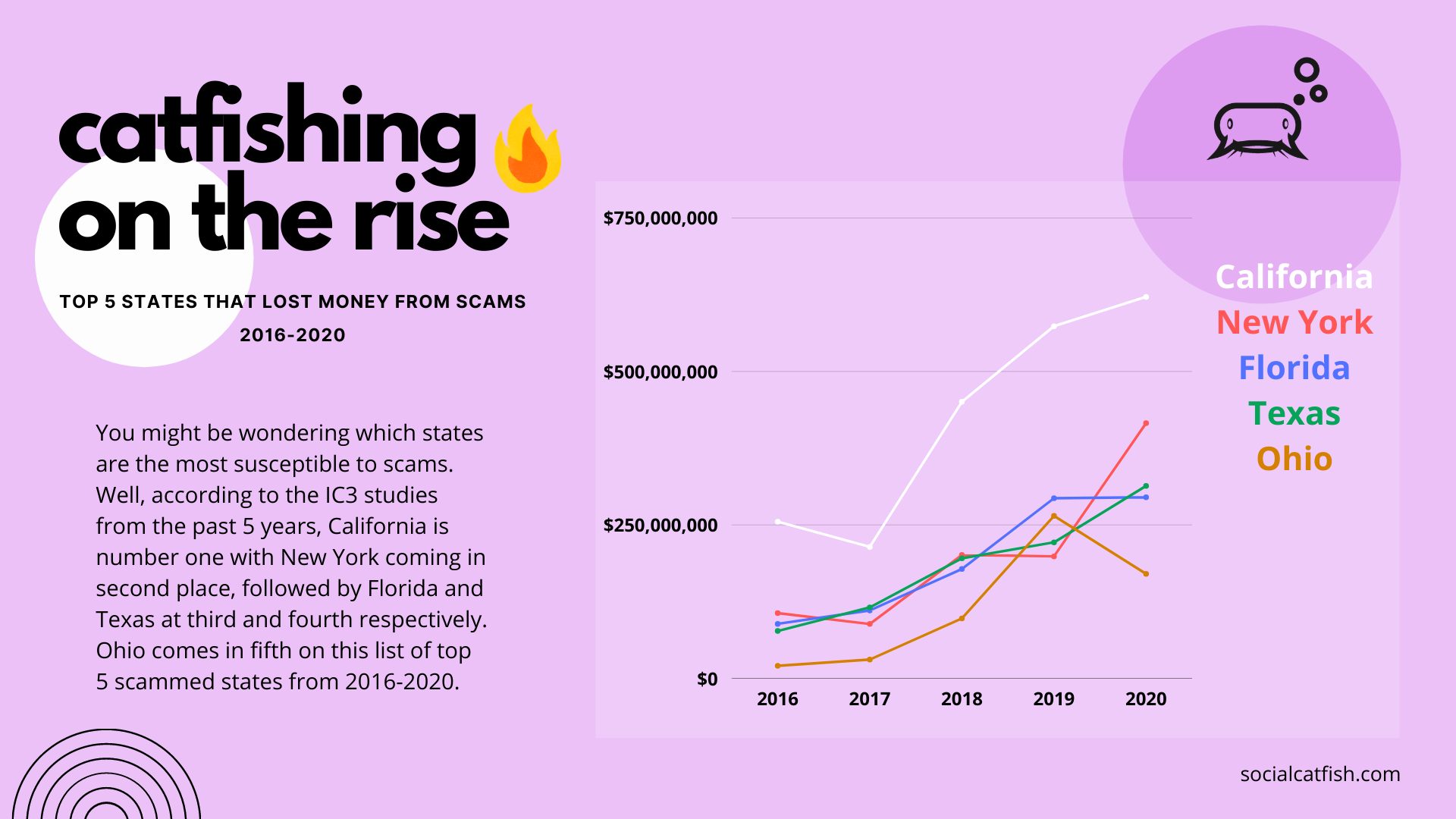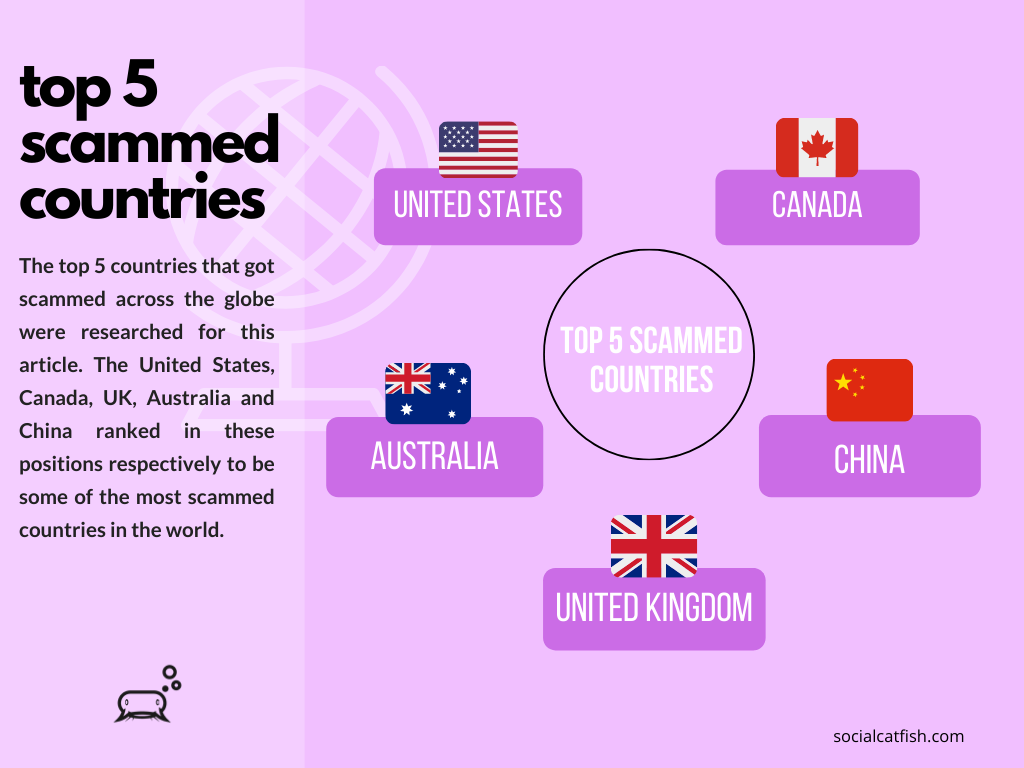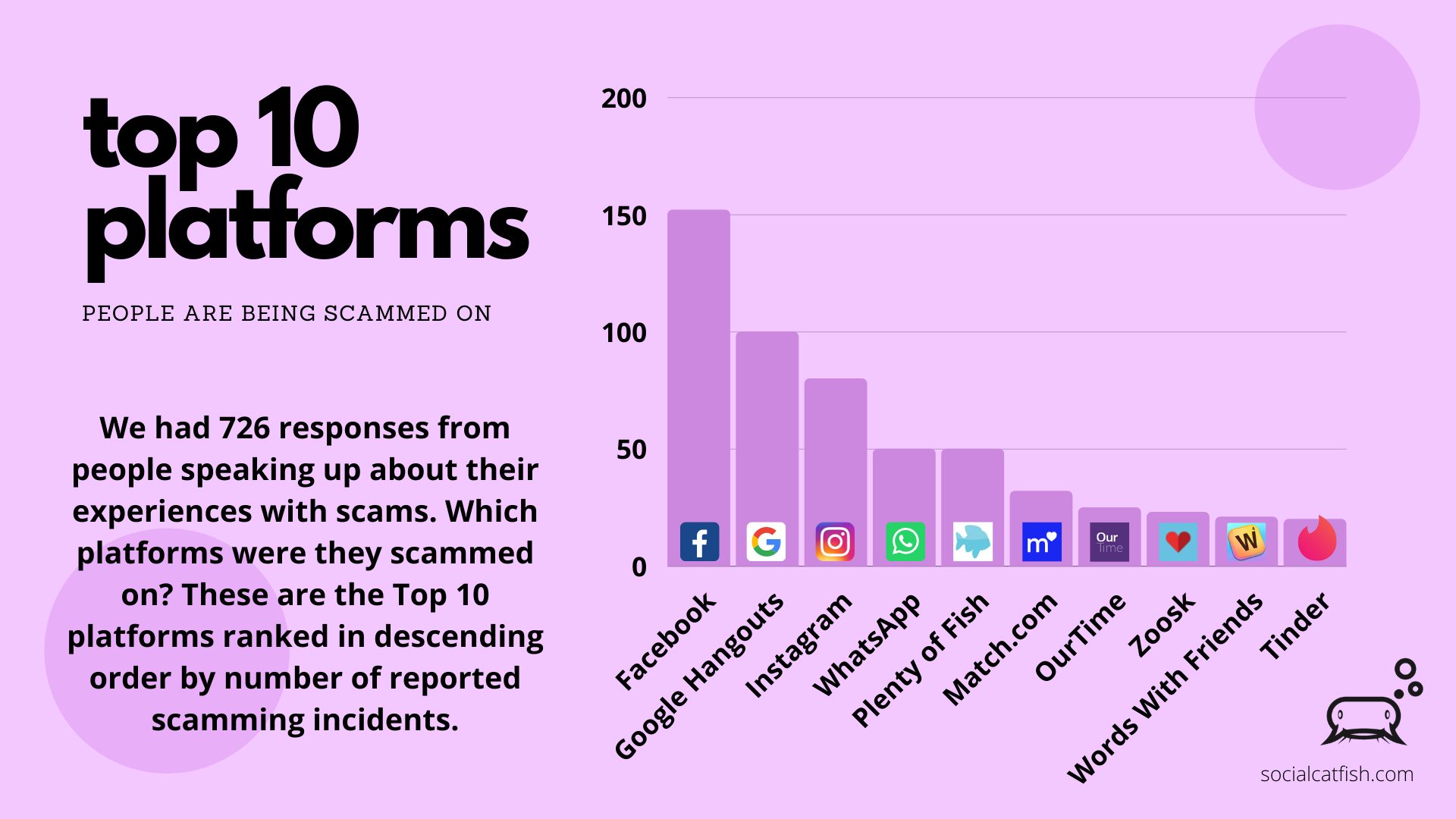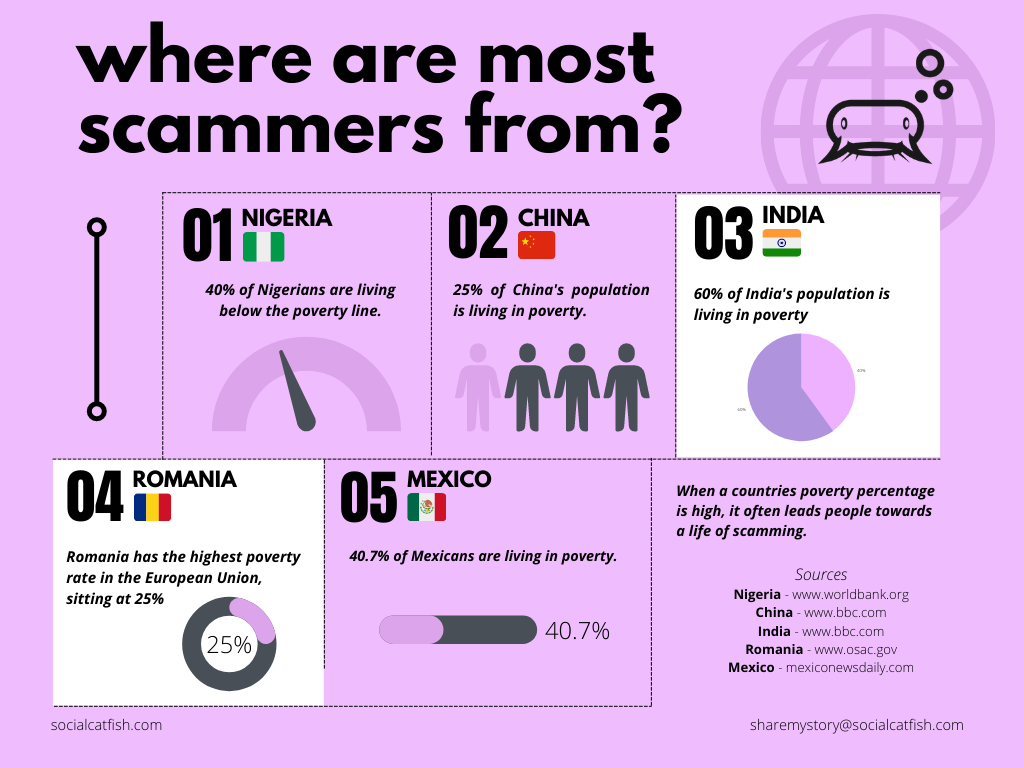A record $4.2 billion was lost by Americans to online scams in 2020, with victims often losing their life savings and taking their own lives. It accounts for more than half of the total loss worth $7.6 billion lost over the previous three years from 2017-2019. The crisis is worsening, which is why we are releasing the first study on State of Internet Scams 2021 to offer a comprehensive and real-time overview. The purpose of this study is to equip people with the knowledge required to avoid becoming a victim. The mission of Social Catfish is to help eradicate Internet scams.
We intend to release a State of Scams study annually to make sure that people are aware of the latest scams.
Methodology of the State of Internet Scams 2021

-
We analyzed data released by the Internet Crime Complaint Center (IC3), Federal Trade Commission (FTC), and the Federal Bureau of Investigation (FBI) in 2021.
-
We included proprietary survey results after polling nearly 722 members of the Facebook group from SocialCatfish.com called Social Catfish (SCF) Seekers. This group comprises Facebook users who have been scammed out of money.
-
We interviewed cybersecurity experts and a detective as well as polled our SCF Seekers Group on Facebook and sent a poll out via our subscribers to get these results.
Key Findings of the State of Internet Scams 2021
-
Total Reported Money Lost in 2020: The IC3 reported a record loss worth $4.2 billion due to online scams in 2020, as stated by the victims who came forward. It accounts for more than half of the $7.6 billion total loss over the previous three years from 2017-2019.
-
Actual Money We Project Lost in 2020: According to the poll we sent out to our email lists and Facebook group, the total amount of loss was estimated to be between $9,810,247 and $18,089,500 among the 722 people that were polled. We think that the amount lost of $4.2 billion reported by the IC3 is larger than what they stated because according to the poll, 73% of the 722 victims are too ashamed to file a report for all online scams.
-
20 years old and Younger has the Fastest Growth Rate of Victims: Counterintuitively, the number of victims aged 20 years old and younger have shown the fastest growth rate since 2017, according to the IC3. In 2017, there were 9,053 victims compared to 23,186 victims in 2020, showing a surge of 156% in the number of victims. We also interviewed the senior editor of Security.org Aliza Vigerman, who ran a survey on identity theft where 700 adults from the United States responded. She stated that those who are between the ages of 18 and 29-years-old were the most likely to be victims of identity theft at 15% compared to those who were 45 and older at 8%.
-
Spoofing: People need to be aware of a new and highly effective scam, namely spoofing, due to which $216,513,728 was lost in 2020 against the loss of $0 in 2017. Spoofing allows scammers to make their phone number appear as if it belongs to your bank, credit card company, or any other company with whom you do business transactions.
-
Apps Where Most People are Scammed: According to the poll we ran of 726 responses, the top 5 platforms where the most people are scammed are Facebook with 152 people scammed on the platform, Google Hangouts with 99 people scammed on the platform, Instagram with 80 people scammed on the platform, WhatsApp with 50 people scammed on the platform, and POF with 50 people scammed on the platform as well.
-
5 States With The Highest Loss Across all Scams: According to the IC3, California was at number one to witness the highest monetary loss of $621,452,320 with 69,541 victims (on average, $8,936 was lost per person). The second state with the largest amount of money lost was New York losing $415,812,917 with 34,505 victims ($12,051 was the average loss per person). The third state with the most amount of money loss was Texas who lost $313,565,225 with 38,640 victims ($8,115 was lost per person on average). The fourth state losing a high amount of money was Florida at $295,032,829 with 53,793 victims ($5,485 was lost per person on average). The fifth state witnessing the largest money loss was Ohio at $170,171,951 with 13,421 victims ($12,679 was average per person loss).
-
The 5 States That Have the Lowest Loss: According to the IC3, the list of states experiencing the lowest amount of money lost was ruled by South Dakota that lost $3,208,241 with 777 victims ($4,129 was lost per person on average). The second state to lose the lowest amount of money was Vermont at $4,175,799, with 856 victims ($4,878 was lost per person on average). The third state that had the lowest amount of money lost was West Virginia at $4,823,786 with 1,902 victims ($2,536 was per person loss on average). The fourth state witnessing the lowest amount of money loss was New Hampshire at $4,949,296 with 2,015 victims (average loss per person was $2,456). The fifth state to lose the lowest amount of money was Wyoming, at $5,096,704 with 913 victims ($5,582 was an average loss per person).
-
5 Scams That Stole the Most: According to the IC3, the first scam with the highest amount of money loss was the Business Email Compromise (BEC) Scam causing a loss worth $1,866,642,107 impacting 19,369 victims ($96,372 was lost per victim on average). The second scam with the largest amount of money lost was the romance scam inducing a loss worth $600,249,821 with 23,751 victims ($25,272 was lost per victim on average). The third scam causing the highest amount of money loss was the investment scam of $336,469,000 with 8,788 victims ($38,287 was lost per victim on average). The fourth scam with the highest amount of money loss was the online shopping scam (non-payment/non-delivery scams), causing a loss of $265,011,249 with 108,869 victims ($2,434 was lost per victim on average). The fifth scam with the huge amount of money loss was the identity theft scam accounting for the loss of $219,484,699 with 43,330 victims ($5,065 was lost per victim on average).
-
Law Enforcement Jurisdictional Issues: A major impediment to stopping online scams is that scammers generally originate from outside the U.S. Thus when a victim comes forward, law enforcement does not have the jurisdiction authority to pursue the scammer. By speaking with law enforcement, efforts are being made to work with countries around the world to combat this issue.
-
The Technology Behind Scams: We interviewed a few cybersecurity experts to get the most accurate data on how the technology behind scams works and how people can use technology to prevent scams. We figured out that the best way people can avoid scams is through education, password managers, and allowing for AI technology to find scam emails within their inboxes. We also found out that scammers will use any piece of technology they can get their hands on, but will mainly use data breaches to get their hands on victims’ personal information and phishing scams to steal passwords and financial information.
Victims Under 20 Years Old Are Being Scammed At a Faster Rate Than Seniors
2017 Victims By Age Group
2020 Victims By Age Group
The number of scam victims has been increasing significantly from 2017 to 2020, especially amongst specific age groups.
We are shocked to see that the number of victims who are younger than 20 years has increased by 156% since 2017. According to HuffPost, this is due to the fact that they have grown up with computers and are more comfortable with sharing personal details online. A major example of this would be innocent-looking online quizzes posted on social media or someone claiming to desire to be their online friend so that the victims would trust them enough to give away their personal information.
We also interviewed the senior editor of Security.org Aliza Vigerman, who ran a survey on identity theft where 700 adults from the United States responded. She stated that those who are between the ages of 18 and 29-years-old were the most likely to be victims of identity theft at 15% compared to those who were 45 and older at 8%.
The number of victims who are over 60 years old has increased by 112% since 2017. According to the FBI, this is because they are very trusting and polite individuals. Scammers take advantage of their willingness to help and come up with emergencies, making victims feel like they should help the person whom they are talking to. Scammers also target seniors due to their plethora of savings left after working most of their lives, meaning that they are more likely to have a larger savings account, good credit, and own a property.
State of Internet Scams 2021: The Technology Behind Scams

At Social Catfish, we interviewed a few cyber technology specialists about the state of online scamming and how we might be able to use emerging technology to combat scams. According to Chris Hauk of Pixel Privacy and Paul Bischoff of Comparitech, artificial intelligence can track a pattern in scam emails using large datasets and delete scam emails from people’s inboxes.
Along with this, Dave Hatter from IntrustIT stated that users should stop, think and protect themselves. He suggests that people should use different passwords for all their online accounts by using a password manager. If a user’s password is the same for all online accounts and is leaked by a data breach, a scammer would be able to access all online accounts that the user has. However, if each password is different, only one account would be compromised. He also thinks users should educate themselves in knowing when a scammer is messaging them and to be skeptical about each message they receive.
According to Hatter, scammers will use any source of technology they can find to scam their victims. According to Hauk, scammers will steal data from their victims using the dark web to look for the latest data breaches. According to Bischoff, he also agrees that scammers use data breaches to steal victims’ information and he also states that they heavily rely on phishing emails to trick victims out of passwords and financial information.
Where Are People Getting Scammed?

Most Scammed States

According to the IC3, people are being scammed more in heavily populated states. The top 5 states that lost the most money due to scams in 2020 include California, New York, Texas, Florida, and Ohio. Here is the most recent data from scam losses of 2020:
-
California: $621,452,320
-
New York: $415,812,917
-
Texas: $313,565,225
-
Florida: $295,032,829
-
Ohio: $170,171,951
Most Scammed Countries

Some of the most scammed countries around the world include the United Kingdom, Canada, United States, Australia, and China. According to “Which? News”, online scams in the United Kingdom have risen 22% since the start of the coronavirus pandemic. According to the UK Finance Fraud Guide by LexisNexis, citizens of the United Kingdom have lost 1.3 billion pounds to fraud, which equals 1.7 billion United States dollars. The criminals used the coronavirus as an excuse for many of their scams in order to trick their victims out of money. They are also telling their victims that they need to purchase the coronavirus vaccine in order to receive it.
This isn’t the only country that has been affected by scams due to the coronavirus pandemic. According to CTV News, the citizens of Canada have lost $37,447,790 Canadian dollars in 2020 which equals $30,390,566.74 US dollars. This is due to scammers using the coronavirus pandemic as an excuse. Jeff Thomson, a Senior RCMP Intelligence Analyst at the Canadian Anti-Fraud Centre states that it’s due to many people that are working from home and increased online activity.
While Canada did lose a lot of money, the IC3 has reported that the United States lost $4.2 billion in the year 2020. There have been 2,000 complaints reported a day in the year 2020, and this doesn’t even include everyone that has been scammed. Around 73% of people that have been scammed never report the scam to the IC3 or the FTC according to a poll run by Social Catfish.
Along with this, Australia lost $896,115 Australian dollars which equates to 679,546.41 United States dollars according to the ACCC. Scammers in Australia are also taking advantage of the pandemic through the use of vaccination scams and phishing. Finally, according to Xinhuanet, the Chinese government has had to block 140 million fraudulent calls, 870 million messages, and 316,000 fraudulent URL domains in the year 2020. Due to the coronavirus, they have punished 7,500 scam suspects and settled 16,000 cases.
Many scammers take the cyber security laws of their target location into consideration before launching their attacks and manage to work their way around them. Others depend on uninformed victims to take the bait or to come across people who are willing to “take the risk” if it brings along a high reward. A lot of scams do not seem malicious at first and can be as simple as someone trying to sell a product not available to them. There are also more invasive scams that take over your computer devices and steal your money, resources, and even your identity.
What Platforms are People Getting Scammed On?

At Social Catfish, we polled our users through our Facebook group SCF Seekers and by email to see what platforms they were getting the most scammed on for this State of Internet Scams 2021 Scam Guide. Out of 726 responses, we were able to find the top 10 platforms that people get the most scammed on. The number one platform that people get the most scammed on is Facebook. This is due to the number of fake profiles that are made within this social media network. Out of 726 responses, 152 admitted to being scammed on this platform.
The second platform that people need to watch out for is Google Hangouts. This is due to the fact that when scammers meet their victims on dating sites, they don’t want their profiles to be reported on the website. Many scammers claim they don’t go on the dating app that much or don’t like talking on it so that they can lure their victims off the app and communicate with them via Google Hangouts to avoid getting reported on the dating app. Out of 726 responses, 99 people have claimed that they got scammed on this app.
The third app that people need to be wary about is Instagram. Many scammers create fake profiles on this app and message their victims out of the blue. They claim that their victim is gorgeous and they would like to get to know their victims more. There are many Instagram accounts that are public, so it’s easier for them to receive these types of messages as opposed to those with private accounts. Out of 726 responses, 80 people have claimed that they have gotten scammed on Instagram.
The fourth app that people need to watch out for is WhatsApp. Like Google Hangouts, scammers lure victims onto WhatsApp for various reasons due to the fact that they don’t want their account reported on the dating app that they are using. They figure that if they talk to their victim on a different platform, there is no chance that their account will be reported for fraudulent activity. Victims fall for this scam and chat with their scammer on the app, which is why 50 of our users have gotten scammed on this platform.
The fifth app that people need to watch out for is Plenty of Fish (POF). This dating app is filled with fake profiles looking to scam their victims out of hard-earned money. These scammers steal pictures from social media influencers and use them to create fake profiles on dating networks. Victims think that the people in the photos are real and fall in love with the people communicating with them. This makes them more vulnerable to romance scams as they shell out their life savings to these scammers. 50 of our users have fallen for a scam on POF.
Want to learn more about platforms people were scammed on? Check out our scam guide by scrolling down to the download.
How Do Scammers Scam People?

Scammers create a variety of tricks to scam people out of their hard-earned money. They create fake profiles and go onto social media platforms, dating sites, and online gaming apps to start conversations with their victims. They use a pre-made script to talk to their victims called the scammer’s playbook. These victims have no idea that they are talking to a scammer and think that they are talking to the person in the photos. Then, the scammers come up with excuses as to why they might need your money or even other things of value, such as gift cards or cell phones. Oftentimes, scammers will get their victims to send them money in the form of Google Play Cards, or cryptocurrency.
What Technology Do They Use to Scam People?
Scammers use phishing emails, spoofing phone calls through VOIP phone numbers, robocalls, viruses, pop-up advertisements, fake profiles, and many other methods to scam their victims. They use countless amounts of technology to hide their identities so that no one can easily track down who they are…
Phishing Emails: Scammers create fake emails that contain links to fake websites and pretend to be trusted businesses. Victims believe that they are a business that can be trusted, so they click on the link and view the too-good-to-be-true deals listed on the fake website. Victims hand over their personal and financial information, thinking that they are getting a good deal. However, all these victims will face is the theft of their money and identity. There are also times when scammers will create a fake email, claiming that the victims need to verify their accounts. However, when victims click on the link and type in their account information, they are actually giving their account information to scammers.
VoIP Phone Numbers: These phone numbers are from third-party apps, meaning that scammers can choose any location they want to showcase and make a phone number based on that location. They can also spoof Caller IDs to make their victims believe that they are someone else. These phone numbers are not associated with a specific location, so it is hard to track down where people with VoIP numbers are coming from.
Fake Dating/Social Media Profiles: Scammers create fake profiles on dating apps and social media sites in order to catfish the victims. They do this by finding a social media influencer on Instagram who is not a worldwide-known celebrity but has a public profile that can be viewed. They also target someone who is good-looking with a successful career in order to attract the victims. They steal all the photos of these influencers and put them on their own profile, passing them off as the person whose photos they stole. The scammers also learn their interests so that they can copy these influencers when talking to the victims.
Scammer’s Playbook
The scammer’s playbook is a script that the scammer boss gives to his scammer employees in order to scam the victims. These playbooks have phrases on a variety of different topics that the scammers can copy and paste to the victims. The playbooks have romantic phrases, conversation starters, and questions that show concern to the victim.
These phrases are supposed to trick the victims into believing that the scammers care for them when in reality, scammers just want to get their hands on victims’ hard-earned cash. For example, a romantic paragraph that someone sent you over the Internet could be an example of a phrase that was written in the scammer’s playbook.
You can view the scammer’s playbook in this State of Internet Scams 2021 Scam Guide by clicking the links below:
Click Here to Read the First Messages from the Scammer’s Playbook!
Click Here to Read Follow-Up Messages From the Scammer’s Playbook!
Where Are Scammers From?

Nigeria
According to the World Bank, 40% of Nigerians are living below the poverty line and 25% of people are at risk of falling below the poverty line. Because of this, scammers are faced with the challenge to find a career path that will fund their families, which is why they go to scamming. They know that if they scam at least one person out of $1,000 United States dollars, it will equal $410,500 Nigerian Naira which is enough to feed their families for a year.
Now, this scam has evolved with the presence of the internet. Scammers use dating apps, emails, and social media platforms to sell you fake stories and convince you to help them with money transfers. Reasons include taxes or government restrictions in their country. Then, they ask for your bank details so that they can transfer the money to you, but in reality, they will use your personal information to drain your bank account.
Do not reply to someone claiming to be a foreign government or business member asking for help with transferring a huge sum of money. Do not share your personal details, and never send money to a stranger trying to approach you online.
China
According to the BBC, 25% of China’s population is living in poverty which makes up around 600 million people. Because of this, there are people in China who are desperate to feed their families while living in poverty. Since $1,000 United States dollars is equal to 6,472 Yuan, there are some Chinese citizens that have become scammers out of desperation to make money. They utilize technology to scam other people. For instance, they will pretend to be your husband’s mistress, sending you disturbing images. Your phone gets a Trojan virus once you click on the link. Then, they retrieve passwords, images, and other information for blackmailing your family. Other types of online scams in China include lottery-winning scams, online part-time job scams, phishing websites, and online shopping scams.
India
According to the BBC, Piyush who worked in an Indian Call Centre has stated why he chose to scam victims in the United States and the United Kingdom. He has stated that it was “easy money” and that he wasn’t getting a job anywhere else, making scamming his only option. He felt bad but did it because he needed the money and didn’t know how else to get it. While the unemployment rate has gone down since this article has been written in 2020, it is still at a whopping 6.9% in India, making people desperate to find a job. Online scams include phishing or email scams, identity theft, and lottery fraud. Scammers will send you an email telling you that you have won a lottery. Then, they will ask you to send a small amount for tax reasons or make your payment through fake websites using your credit or debit card. To avoid becoming their next victim, do not share your bank details.
Romania
According to OSAC, Romania has become a hot spot for cybercrime. There have been reports of phishing, credit card fraud, hacking, and romance scams. OSHA warns people to be very careful when proceeding with an online relationship with someone from Romania. This is due to having the highest poverty rate in all of the European Union according to the EAPN. The scams that they have used to fool innocent victims are online dating scams, phishing, and even selling products that do not exist. While not all of these scammers use expert methods, they usually work, so do not share personal information or send money to anyone you barely know online.
Mexico
According to Mexico News Daily, 40.7% of their nation are living in poverty due to the coronavirus pandemic making many people lose their jobs. Many people don’t know where to work to make their money back, so they have started to rely on scamming victims out of money. This is due to the fact that if you scam someone in the United States out of $1,000, you can turn that into 19,856 Mexican pesos.
State of Internet Scams 2021: How to Avoid These Scams

-
Do not give money to someone on the Internet whom you have never met in person.
-
Do not give out your personal information to someone with whom you are talking online.
- Keep updated with resources, such as the State of Internet Scams 2021 Scam Guide.
-
Do not trust that someone is who they say they are without at least video chatting with them or meeting them in person first.
-
If they have a job overseas, this is a huge red flag that they might be a scammer since they usually use this as an excuse to not see you or video chat with you.
-
If someone is randomly contacting you out of the blue on Facebook, Instagram, or Twitter, it usually means that a scammer is on the other side.
-
Make sure to have a password manager to create many passwords for your accounts. This will prevent scammers from easily guessing your passwords.
-
Use AI technology to find scam emails before they can fool you into thinking they are real.
-
Search up your email on our email address reverse search to make sure your information hasn’t been compromised by a data breach.
-
If you have been a victim of identity theft, please report your case to IdentityTheft.gov for further assistance in recovering your identity.
-
Report any scam that you have been a part of immediately to the FTC, IC3, and FBI.
Click Below to Download the First-Ever State of Internet Scams 2021 Scam Guide
Click Here to Download the First-Ever State of Internet Scams: Scam Guide 2021
Social Catfish is Here to Help You with the State of Internet Scams 2021!
We hope that you enjoyed this informative guide brought to you by SocialCatfish.com. We want to thank you for taking out the time to read The State of Internet Scams 2021 and hope that you enjoyed it. We want to remind everyone that anyone can be scammed, so it is always a good idea to be careful about whom you trust. You can verify that the person you are talking to is really the one whom they claim they are by using our search bar 24/7. All you need to do is look up the name, email address, phone number, social media username, or image of the person you are talking to in order to verify their identity.


 September 27, 2023
September 27, 2023


















